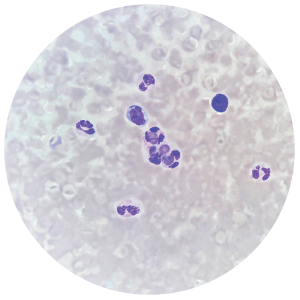
Lupus erythematosus cells on 100X light microscope stain.
Sunisa Butphet / shutterstock.com
SAN FRANCISCO—The 13th International Congress on Systemic Lupus Erythematosus (SLE), held April 5–8, highlighted continuing advances in the fight against lupus, a chronic, inflammatory, autoimmune disease affecting multiple organ systems.
The rheumatologist’s ability to control this incurable and life-threatening condition is limited both by its heterogeneous presentation and by the lack of successful treatment options, with only one drug, belimumab, approved for lupus treatment in recent years. “But we are getting better in the science of how to study the drugs that might make a difference,” said Ronald van Vollenhoven, MD, PhD, professor of rheumatology and head of the Clinical Immunology and Rheumatology Department at the Academic Medical Center of Amsterdam University in The Netherlands.
“Part of that is learning how to do clinical trials that can produce clear results. Our methods of testing are getting better, although there’s still a long way to go,” Dr. van Vollenhoven said. He co-facilitated a plenary session at the Congress, highlighting six important clinical trials of treatments for lupus. “Some of the studies were successful, some were not successful in terms of their primary endpoints. But all presented interesting data,” he said.
Dr. van Vollenhoven, who predicts U.S. Food and Drug Administration approval for several new lupus drugs is likely within the next few years, shared his own research on ustekinumab, an immunosuppressive treatment already used for severe plaque psoriasis, psoriatic arthritis and Crohn’s disease.
“That’s a great story,” he told The Rheumatologist. “A group of scientists took a look at 14 biologics approved in recent years for different rheumatic conditions. They analyzed, using a sophisticated algorithm, their potential as treatments for lupus.” At the top of the list was ustekinumab, a monoclonal antibody that targets interleukin 12 and 23. This would be a novel mechanism of treating lupus, but both of these cytokines have already been implicated in the pathogenesis of lupus. The researchers then approached its manufacturer, Janssen Biotech—which at first was reluctant but eventually agreed—to fund a phase 2 study in recognition of the importance for finding new drugs to treat lupus.

Dr. van Vollenhoven
Dr. van Vollenhoven’s trial found the Systemic Lupus Erythematosus Responder Index (SRI(4)) response was significantly greater in the ustekinumab group than
in the placebo group (62% vs. 33%), demonstrating sustained clinical benefit to global and organ-specific SLE disease activity—including greater joint and skin improvement.1
Patients who crossed over from the placebo to the test group also showed clinical improvement. A phase 3 trial of ustekinumab for treating lupus is now underway, recruiting patients at centers in a number of countries, Dr. van Vollenhoven told attendees. “We hope to complete enrollment by October for a full-year study of the treatment,” he said.
Immunotherapeutic Vaccine Studied
Another provocative line of research was presented at the plenary session by Frédéric Houssiau, MD, PhD, head of the Rheumatology Department at Catholic University of Louvain, Brussels.2 Interferon alpha kinoid is an investigational heterocomplex of inactivated recombinant human interferon that can act as an immunotherapeutic vaccine—stimulating the body itself to produce antibodies.
In a 36-week, phase 2b randomized controlled trial in 185 patients with moderate to severe lupus disease activity, interferon alpha kinoid indeed neutralized interferon and was well tolerated, with fewer adverse effects than treatment alternatives, Dr. Houssiau reported. But the biologic and clinical primary endpoints were negative in this first clinical trial. Modified British Isles Lupus Assessment Group-Based Composite Lupus Assessment scores did not differ significantly between interferon alpha kinoid and placebo groups at Week 36. However, its significant steroid-sparing effects merit further evaluation in a phase 3 trial, he said.
Treatment Trials
Another plenary presenter, Maria E. Silk, PharmD, clinical research advisor with Eli Lilly & Co., reviewed research on baricitinib, a widely approved rheumatoid arthritis treatment that selectively inhibits Janus kinase, for patients with lupus. In a test of baricitinib in 2 and 4 mg daily doses, the latter was associated with significant clinical improvements vs. placebo.3
Tacrolimus and other, newer calcineurin inhibitors (CNIs), including voclosporin, have potential as treatment strategies for lupus nephritis (LN), which affects about half of adults with lupus. C.C. Mok, MD, chief of rheumatology in the Department of Medicine at Tuen Mun Hospital, Hong Kong, reviewed data on tacrolimus as an alternative to, and in combination with, conventional treatments mycophenolate mofetil, cyclophosphamide and glucocorticoids.4 The advantages of tacrolimus therapy include greater safety in pregnancy, with no effect on fertility, although it can provoke higher infection rates, chronic CNI nephropathy and long-term cardiovascular risks.
Y.K. Onno Teng, MD, PhD, a nephrologist at Leiden University Medical Center, The Netherlands, outlined recent therapies that target B cells, including treatment with rituximab followed by belimumab, in response to aberrant B cell repopulation in refractory lupus patients.5 These studies include the Lupus Nephritis Assessment with Rituximab (LUNAR) study, the Beat Lupus trial and BLISS-BELIEVE.6-8
Finally, the multi-center, multi-national Efficacy and Safety of Belimumab in Black Race Patients with Systemic Lupus Erythematosus (EMBRACE) study examined lupus in 448 patients self-identifying as black, who experience increased lupus prevalence, morbidity and mortality compared with other racial groups. Historically, black patients have been under-represented in large clinical trials of lupus.
The EMBRACE study, presented at the Congress by Jim Oates, MD, professor and director of the Division of Rheumatology and Immunology at Medical University of South Carolina, Charleston, did not meet its primary endpoints, although numerical trends were observed in favor of belimumab.9 These included a lower risk of experiencing severe flares and greater prednisone drug reductions.
In Conclusion
Older and conventional therapies used with lupus patients often suppress the immune system overall, with a greater risk for negative side effects, Dr. van Vollenhoven said. The newer drugs, mostly biologics or targeted therapies, aim to selectively stop some aspect of immune response. Some are very specific in their target. Novel and slightly unconventional approaches to solving this puzzle hold particular promise, he noted.
Larry Beresford is a medical journalist in Oakland, Calif.
References
- Van Vollenhoven R, Hahn BH, Tsokos GC, et al. Ustekinumab targets a novel mechanism of action to treat patients with systemic lupus erythematosus. Abstract presentation at 13th International Congress on Systemic Lupus Erythematosus, San Francisco, 2019 Apr 6.
- Houssiau F, Thanou A, Mazur M, et al. Ifnα-kinoid in systemic lupus erythematosus (SLE): Results from a phase 2b, randomized, placebo-controlled study. Abstract presentation at 13th International Congress on Systemic Lupus Erythematosus, San Francisco, 2019 Apr 6.
- Silk ME, Wallace DJ, Furie RE, et al. Baricitinib in patients with systemic lupus erythematosus: Results from a phase 2, randomized, double-blind, placebo-controlled study. Abstract presentation at 13th International Congress on Systemic Lupus Erythematosus, San Francisco, 2019 Apr 6.
- Mok CC. Calcineurin inhibitors in the management of SLE. Abstract presentation at 13th International Congress on Systemic Lupus Erythematosus, San Francisco, 2019 Apr 6.
- Onno Teng YK. Combining B-cell targeted therapies in SLE. Abstract presentation at 13th International Congress on Systemic Lupus Erythematosus, San Francisco, 2019 Apr 6.
- Rovin BH, Furie R, Latinis K, et al. Efficacy and safety of rituximab in patients with active proliferative lupus nephritis: The Lupus Nephritis Assessment with Rituximab study. Arthritis Rheum. 2012 Apr;64(4):1215–1226.
- BEAT Lupus Trial.
- Teng YKO, Bruce IN, Diamond B, et al. Phase III, multicentre, randomised, double-blind, placebo-controlled, 104-week study of subcutaneous belimumab administered in combination with rituximab in adults with systemic lupus erythematosus (SLE): BLISS-BELIEVE study protocol. BMJ Open. 2019 Mar 20;9(3):e025687.
- Oates JC, D’Cruz D, Maksimowicz-McKinnon K, et al. Efficacy and safety of belimumab in patients of black race with systemic lupus erythematosus: Results from the EMBRACE study. Abstract presentation at 13th International Congress on Systemic Lupus Erythematosus, San Francisco, 2019 Apr 6.

